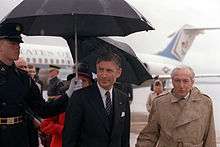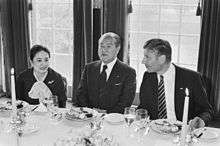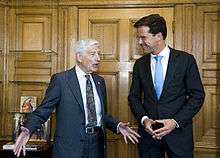Dries van Agt
| His Excellency Dries van Agt | |
|---|---|
|
Dries van Agt in 2011 | |
| 46th Prime Minister of the Netherlands | |
|
In office 19 December 1977 – 4 November 1982 | |
| Monarch |
Juliana (1977–1980) Beatrix (1980–1982) |
| Deputy |
See list
|
| Preceded by | Joop den Uyl |
| Succeeded by | Ruud Lubbers |
| Ambassador of the European Union to the United States | |
|
In office 1 January 1990 – 1 April 1995 | |
| Preceded by | Roy Denman |
| Succeeded by | Hugo Paemen |
| Ambassador of the European Union to Japan | |
|
In office 1 January 1987 – 1 January 1990 | |
| Preceded by | Laurens Jan Brinkhorst |
| Succeeded by | Unknown |
| Queen's Commissioner of North Brabant | |
|
In office 1 June 1983 – 22 April 1987 | |
| Monarch | Beatrix |
| Preceded by | Jan Dirk van der Harten |
| Succeeded by | Frank Houben |
| Minister of Foreign Affairs of the Netherlands | |
|
In office 28 May 1982 – 4 November 1982 | |
| Prime Minister | Dries van Agt |
| Preceded by | Max van der Stoel |
| Succeeded by | Hans van den Broek |
| Parliamentary leader of the Christian Democratic Appeal in the House of Representatives of the Netherlands | |
|
In office 10 June 1981 – 24 August 1981 | |
| Preceded by | Ruud Lubbers |
| Succeeded by | Ruud Lubbers |
|
In office 8 June 1977 – 19 December 1977 | |
| Preceded by | New title |
| Succeeded by | Willem Aantjes |
| Leader of the Christian Democratic Appeal | |
|
In office 22 October 1976 – 25 October 1982 | |
| Preceded by | New title |
| Succeeded by | Ruud Lubbers |
| Deputy Prime Minister of the Netherlands | |
|
In office 11 May 1973 – 8 September 1977 | |
| Prime Minister | Joop den Uyl |
| Preceded by |
Roelof Nelissen Molly Geertsema |
| Succeeded by | Wilhelm Friedrich de Gaay Fortman |
| Member of the House of Representatives of the Netherlands | |
|
In office 16 September 1982 – 16 June 1983 | |
|
In office 10 June 1981 – 9 September 1981 | |
|
In office 8 June 1977 – 19 December 1977 | |
|
In office 23 January 1973 – 22 April 1973 | |
| Minister of Justice of the Netherlands | |
|
In office 6 July 1971 – 8 September 1977 | |
| Prime Minister |
Barend Biesheuvel (1971–1973) Joop den Uyl (1973–1977) |
| Preceded by | Carel Polak |
| Succeeded by | Wilhelm Friedrich de Gaay Fortman |
| Personal details | |
| Born |
Andreas Antonius Maria van Agt 2 February 1931 Geldrop, Netherlands |
| Nationality | Dutch |
| Political party |
Christian Democratic Appeal (from 1980) |
| Other political affiliations |
Catholic People's Party (until 1980) |
| Spouse(s) | Eugenie Krekelberg (m. 1958) |
| Children |
Eugenie Frans Caroline |
| Residence | Nijmegen, Netherlands |
| Alma mater | Radboud University Nijmegen (Bachelor of Laws, Master of Laws) |
| Occupation |
Politician Diplomat Civil servant Jurist Lawyer Nonprofit director Lobbyist Activist Author Professor |
| Religion | Roman Catholicism |
| Signature |
|
| Website | (Dutch) Official site |
Andreas Antonius Maria "Dries" van Agt (Dutch pronunciation: [ˈdris fɑn ˈɑxt];[1] born 2 February 1931) is a retired Dutch politician and diplomat of the Christian Democratic Appeal (CDA). He served as Prime Minister of the Netherlands from 19 December 1977 until 4 November 1982.
Van Agt a jurist by occupation, worked as a lawyer for the law firm Van der Putt, Nijst, Van Sandick en Depla from 1956 until 1958 when he became a civil servant for the Ministry of Agriculture and Fisheries and the Ministry of Justice until 1968. Van Agt became a professor of criminal procedure at the Radboud University Nijmegen in 1968. After the Dutch general election of 1971 Van Agt was asked by the Catholic People's Party (KVP) to become Minister of Justice in the Cabinet Biesheuvel I. Van Agt accepted and resigned as a professor the same day he took office as the new Minister of Justice on 6 July 1971. Van Agt remained Minister of Justice in the Cabinet Den Uyl following the Dutch general election of 1972 and also became Deputy Prime Minister on 11 May 1973. On 22 October 1976 Van Agt was selected as the first Leader of the Christian Democratic Appeal and became the Lijsttrekker (top candidate) for the Dutch general election of 1977. He resigned as Deputy Prime Minister and Minister of Justice to become the first Parliamentary leader of the Christian Democratic Appeal in the House of Representatives and a Member of the House of Representatives taking office on 8 June 1977. Following the election the Christian Democratic Appeal became the second largest party in the House of Representatives.
After a failed cabinet formation with the Labour Party, Van Agt struck a deal with the Leader of the People's Party for Freedom and Democracy Hans Wiegel that resulted in the formation of the Cabinet Van Agt-Wiegel with Van Agt becoming Prime Minister of the Netherlands taking office on 19 December 1977. With the following Dutch general election of 1981, Van Agt again as Lijsttrekker lost one seat and a coalition formation with the Labour Party and the Democrats 66 (D66) resulted in the Cabinet Van Agt II. On 29 May 1982 the Cabinet Van Agt II collapsed after the Labour Party retracted their support. A rump cabinet Van Agt III was formed with Van Agt also serving as Minister of Foreign Affairs. The Cabinet Van Agt III stayed in office until the Dutch general election of 1982. Van Agt again as Lijsttrekker lost three seats and the Christian Democratic Appeal became the second largest party. A cabinet formation with the People's Party for Freedom and Democracy (VVD) was formed but Van Agt unexpectedly announced his retirement from national politics and stood down as Leader of the Christian Democratic Appeal on 25 October 1982. Van Agt remained Prime Minister of the Netherlands until the Cabinet Lubbers I was installed on 4 November 1982.
After his premiership, Van Agt remained in active politics and became the Queen's Commissioner of North Brabant taking office on 1 June 1983. On 22 April 1987 Van Agt resigned as Queen's Commissioner because of criticism on his cooperation with the States-Provincial. Van Agt he became a diplomat for the European Communities and served as Ambassador of the European Union to Japan from 1 April 1987 until 1 January 1990 when he became Ambassador of the European Union to the United States serving until 1 April 1995 when he retired from politics at the age of sixty-four. Following the end of his active political career, Van Agt occupied numerous seats on supervisory boards on international non-governmental organizations (InterAction Council, Green Cross International and the Edmund Burke Foundation). Van Agt served as a visiting professor of international relations at the Ritsumeikan University, the United Nations University and the Kwansei Gakuin University from 1995 until 2004.
Van Agt is known for his abilities as a negotiator and debater. During his premiership, his cabinets were responsible for reforming the public sector and civil service and the struggle with the recession in the 1980s. He holds the distinction of being the first Christian Democratic Appeal Prime Minister of the Netherlands. Van Agt also has been active as an anti-war and human rights activist and as an advocate in promoting the Two-state solution for the Israeli–Palestinian conflict. Van Agt continues to comment on political affairs as a statesman.[2]
Early life
Andreas Antonius Maria van Agt was born on 2 February 1931 in Geldrop in the Netherlands Province of North Brabant in a Roman Catholic family. After receiving his diploma Gymnasium-A at the Augustinianum he studied at the Catholic University of Nijmegen, where he received his Doctorate in Law in 1955. After graduating, he practiced law in Eindhoven until 1957, after which he worked in the office of legal and business affairs of the Ministry of Agriculture and Fisheries until 1962. From 1962 to 1968, he worked for the Ministry of Justice.
Politics
Minister and Deputy Prime Minister
Van Agt entered politics as a member of the Catholic People's Party, which merged with the other two major Christian Democratic parties in 1980 to form the CDA. From 1968 to 1971, Van Agt was Professor of Criminal Law at the Catholic University of Nijmegen. From 1971 to 1973, he was Minister of Justice in the government of Barend Biesheuvel. He caused outrage when he tried to pardon the last three Nazi war criminals still in Dutch prisons in 1972. From 1973 to 1977 he was Deputy Prime Minister and Minister of Justice in the government of Joop den Uyl.
.jpg)

Leader of the Christian Democratic Appeal
In 1976, Van Agt was elected the first Leader of the Christian Democratic Appeal, then still a federation of the three religious parties CHU, KVP and ARP, which first ran in 1977 with a united list (the merger followed in 1980). With Van Agt as top candidate, the CDA reversed in 1977 years of decline to return to power.
Prime Minister in the Cabinet Van Agt I
In the parliamentary elections of May 1977 the PvdA obtained their largest amount of seats, so a second Den Uyl coalition looked likely. However, the tension between the KVP and the Labour Party in the last reign, combined with the fact that a coalition between CDA and VVD was possible, the talks failed after a period of seven months. Eventually Van Agt negotiated a deal with Hans Wiegel, leader of the VVD. From December 19, 1977 to September 11, 1981 Van Agt was Prime Minister of the Netherlands and Minister of General Affairs in the Cabinet Van Agt I.
Prime Minister in the Cabinet Van Agt II
In 1981, the CDA, VVD and PvdA lost parliamentary seats, so a continuation of a CDA-VVD coalition was not possible. Van Agt, leader of the CDA, was forced to go in coalition with the PvdA. Also Democrats 66 (which, under Jan Terlouw gained a significant amount of seats) participated in the coalition talks, after 3 months of difficult negotiations that resulted in the Cabinet Van Agt II (11 September 1981 – 29 May 1982). In this composition Van Agt worked with Joop den Uyl again as Den Uyl was made Deputy Prime Minister and "super minister" of Social Affairs and Employment. The characterological and political differences led to several divisions, and in May 1982 the government fell.
The personal strife between Van Agt and Den Uyl were so deteriorated that when Den Uyl died in 1987 after a short illness, Van Agt was not invited to the memorial by the family. Den Uyl's wife Liesbeth argued that Van Agt had prevented the second Den Uyl coalition from forming in 1977.



Prime Minister in the Cabinet Van Agt III
The caretaker government went through as a minority cabinet, with only ministers from the parties CDA and D66, in the Cabinet Van Agt III. For replacing the six Labour ministers, five new CDA and D66 ministers were in place, while van Agt in the cabinet, as well as being Prime Minister was also Minister of Foreign Affairs.
New parliamentary elections were organized for September 1982. Although Van Agt, by this point was worn out, he was persuaded again to be Leader of the Christian Democratic Appeal but shortly after the election he withdrew as a candidate for prime minister and was succeeded by Ruud Lubbers.
Queen's Commissioner
when he was appointed as the Queen's Commissioner of the province North Brabant.
After politics
Diplomat
Dries van Agt served as Ambassador of the European Community to Japan from 1987 to 1990 and to the United States from 1990 to 1995. From 1995 to 1996, he was a Visiting Professor of International Relations at the University of Kyoto.
Professor
He is currently Prime Counsellor for the International Forum for Justice and Peace, a foundation under Dutch law, registered at the Chamber of Commerce in Amsterdam. Chaired by retired international businessman Ben Smoes, they are currently focused on justice and peace in regard to the Israel/Palestine conflict
Activist
Van Agt lectured in May 2006 in Cairo at the invitation of the Egyptian electronic magazine Arab-West Report about great changes in the cultural climate of north-western Europe in the past decades, becoming more hostile to religion, including Islam. Muslims, he argued, need to understand those changes in order to be able to respond better to European criticism on Islam and the Muslim world.[3]
Van Agt has also spoken against the Council of State in Egypt for continuous delay in granting the Center for Arab-West Understanding (CAWU) the NGO status. He met with prominent figures in Egypt to persuade them to do so. The Egyptian Council of State, after van Agt's visit to Cairo in 2006, ruled on February 18, 2007 that the Center should be recognized as an NGO under Egyptian law, ending its three-year struggle to obtain this status. Egypt is known for its reluctance in granting NGO status in order to discourage political participation. Cornelis Hulsman, a Dutch sociologist, the editor-in-chief of Arab-West Report, and the head of CAWU, stated that van Agt's effort significantly impacted the realization of their goals, which usually requires a lengthy amount of time and scrutiny in its political purposes.
For some years he has taken an outspoken stance regarding the Middle East, resulting in a fierce criticism of the policies undertaken by the government of Israel with regard to the Palestinians. When in office, van Agt was a staunch supporter of Israel, but after he stepped down in 1982 he changed his mind.[4] According to his own words an important turning point was a visit at the late nineties at Bethlehem University on the Israeli-occupied West Bank.[5][6] He has accused Israel of "state terrorism" and turning the Palestinian Authority territories into "bantustans".[7] In 2012, Van Agt said that Jews should have a state in Germany instead of Israel.[8] In September 2016, in reference to the visit of Prime Minister of Israel Benjamin Netenyahu to the Netherlands, van Agt argued that the ongoing Israeli occupation of the Palestinian territories and the building of settlements there constituted a war crime under the Rome Statute and suggested that Netenyahu should have been sent to the International Criminal Court.[9]
Personal
Van Agt is known for his use of archaic language and complicated phrasing, as well as for his love for cycling. He married his wife Eugenie Krekelberg in 1958, and has three children and seven grandchildren with her. In 2012 he joined the Advisory Board of the International Museum for Family History.
Decorations
| National honours | ||
| Ribbon bar | Honour | Date |
|---|---|---|
| |
Honorary medal for Initiative and Ingenuityof the Order of the House of Orange | 19 September 1974 |
| |
Knight Grand Cross of the Order of Orange-Nassau | 9 December 1982 |
References
- ↑ van in isolation: [vɑn].
- ↑ (Dutch) Dries van Agt (1931), Absolutefacts.nl, 10 December 2008
- ↑ For the full text of his lecture, entitled, “Cultures between Clash and Reconciliation: The Role of the Media and Academia,” see AWR, 2006, week 53, art. 3
- ↑ "Former Dutch PM champions Palestinian cause", Radio Netherlands Worldwide (10 December 2009).
- ↑ (Dutch) "De bekering van Dries van Agt", HP|DE TIJD, 29 September 2006
- ↑ (Dutch) "'Ik kan het wel uitschreeuwen', interview oud-premier Dries van Agt, NRC Handelsblad, 22 augustus 2009
- ↑ Cnaan Liphshiz, 'Dutch Jimmy Carter' accuses Israel of terrorism in new book Haaretz (27-06-2008).
- ↑ Former Dutch PM: Jews should have had a state in Germany, The Times of Israel (11 November 2012).
- ↑ Cockburn, Harry (6 September 2016). "Former Dutch PM calls Benjamin Netanyahu a 'war criminal' who should be tried in The Hague". independent.co.uk. Retrieved 27 September 2016.
External links
- Official
- (Dutch) Mr. A.A.M. (Dries) van Agt Parlement & Politiek
- (Dutch) Kabinet-Van Agt I Rijksoverheid
- (Dutch) Kabinet-Van Agt II Rijksoverheid
- (Dutch) Kabinet-Van Agt III Rijksoverheid
| Wikiquote has quotations related to: Dries van Agt |
| Wikimedia Commons has media related to Dries van Agt. |
.jpg)
